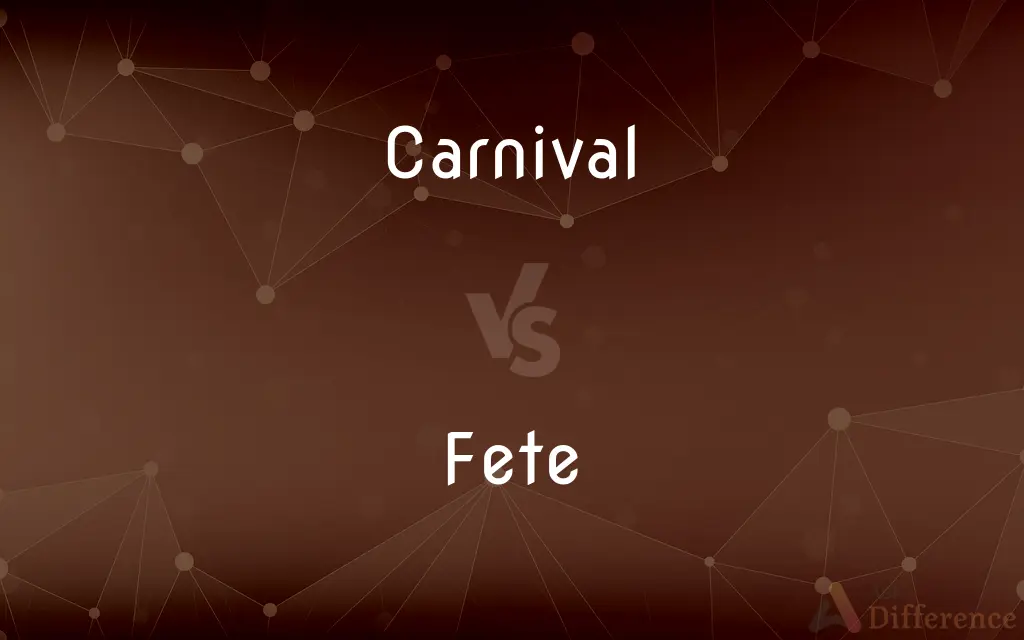Carnival vs. Fete — What's the Difference?
By Fiza Rafique & Maham Liaqat — Updated on May 17, 2024
A carnival is a large public celebration with parades, music, and costumes, often preceding Lent. A fete is a festive event, typically smaller, often community-centered, with games, entertainment, and food.

Difference Between Carnival and Fete
Table of Contents
ADVERTISEMENT
Key Differences
A carnival is a grand, elaborate event that includes parades, floats, music, dancing, and elaborate costumes. It is commonly associated with pre-Lenten celebrations and has deep cultural roots in various countries, particularly in Latin America and Europe. On the other hand, a fete is usually a smaller, more localized celebration, often organized by communities or schools. It includes games, stalls, food, and entertainment, focusing on community bonding and fundraising.
The scale of a carnival is typically much larger than that of a fete. Carnivals attract large crowds and can span several days, featuring large-scale events and professional performers. In contrast, a fete is more intimate and short-lived, usually lasting a day, with activities and entertainment provided by local volunteers and participants.
Carnivals often have historical or religious significance, such as Mardi Gras or the Rio Carnival, which are rooted in cultural traditions and observed by vast audiences. Fetes, however, are generally secular and can be held for various reasons, such as charity fundraisers, school events, or seasonal celebrations.
The atmosphere at a carnival is vibrant and dynamic, with a focus on spectacle and entertainment. Parades with themed floats, costumed participants, and live music are central elements. A fete, by contrast, has a more relaxed and community-oriented atmosphere, with activities like tombola, face painting, and local talent shows.
Comparison Chart
Scale
Large, often city-wide
Smaller, community-centered
ADVERTISEMENT
Duration
Several days
Usually one day
Activities
Parades, floats, costumes, music, dancing
Games, stalls, food, local entertainment
Cultural Significance
Often has historical or religious roots
Generally secular, community-oriented
Atmosphere
Vibrant, dynamic, focused on spectacle
Relaxed, intimate, focused on community bonding
Compare with Definitions
Carnival
A large, public festival with parades and costumes.
The Rio Carnival attracts millions of visitors each year.
Fete
Includes games, food stalls, and local entertainment.
Children enjoyed the bouncy castle at the fete.
Carnival
Celebrations preceding Lent in many cultures.
Mardi Gras is a famous carnival in New Orleans.
Fete
Focuses on community bonding and fundraising.
The fete brought neighbors together for a day of fun.
Carnival
Often includes themed floats and elaborate costumes.
The children's parade during the carnival was a highlight.
Fete
A community-centered festive event.
The village fete included a cake sale and a raffle.
Carnival
Known for its vibrant and lively atmosphere.
The streets were filled with the vibrant energy of the carnival.
Fete
Often organized by local groups or schools.
The school fete raised funds for new playground equipment.
Carnival
A festive event with music, dancing, and entertainment.
The carnival featured live bands and dance troupes.
Fete
Typically lasts for a single day.
The fete took place on a sunny Saturday afternoon.
Carnival
Carnival is a Western Christian festive season that occurs before the liturgical season of Lent. The main events typically occur during February or early March, during the period historically known as Shrovetide (or Pre-Lent).
Fete
A public function, typically held outdoors and organized to raise funds for a charity, including entertainment and the sale of goods and refreshments
A church fete
Carnival
An annual festival, typically during the week before Lent in Roman Catholic countries, involving processions, music, dancing, and the use of masquerade
A carnival parade
Mardi Gras is the last day of carnival
The culmination of the week-long carnival
Fete
Honour or entertain (someone) lavishly
She was an instant celebrity, feted by the media
Carnival
A travelling funfair or circus
He worked at a carnival, climbing Ferris wheels and working 18-hour days
Fete
A festival or feast.
Carnival
Often Carnival The period of merrymaking and feasting celebrated just before Lent.
Fete
An elaborate, often outdoor entertainment.
Carnival
A traveling amusement show usually including rides, games, and sideshows.
Fete
An elaborate party.
Carnival
A festival or revel
Winter carnival.
Fete
To celebrate or honor with a festival, a feast, or an elaborate entertainment.
Carnival
Any of a number of festivals held just before the beginning of Lent.
Carnival of Brazil
Venice Carnival
Fete
To pay honor to.
Carnival
A festive occasion marked by parades and sometimes special foods and other entertainment.
Fete
A festival open to the public, the proceeds from which are often given to charity.
Carnival
(US) A traveling amusement park, called a funfair in British English.
We all got to ride the merry-go-round when they brought their carnival to town.
When the carnival came to town, every one wanted some cotton candy.
Fete
A feast, celebration or carnival.
Carnival
A festival celebrated with merriment and revelry in Roman Gatholic countries during the week before Lent, esp. at Rome and Naples, during a few days (three to ten) before Lent, ending with Shrove Tuesday.
The carnival at Venice is everywhere talked of.
Fete
To celebrate (a person).
Carnival
Any merrymaking, feasting, or masquerading, especially when overstepping the bounds of decorum; a time of riotous excess.
He saw the lean dogs beneath the wallHold o'er the dead their carnival
Fete
A feat.
Carnival
A festival marked by merrymaking and processions
Fete
A festival.
Carnival
A frenetic disorganized (and often comic) disturbance suggestive of a circus or carnival;
It was so funny it was a circus
The whole occasion had a carnival atmosphere
Fete
Feet.
Carnival
A traveling show; having sideshows and rides and games of skill etc.
Fete
To feast; to honor with a festival.
Fete
An elaborate party (often outdoors)
Fete
An organized series of acts and performances (usually in one place);
A drama festival
Fete
Have a celebration;
They were feting the patriarch of the family
After the exam, the students were celebrating
Common Curiosities
What is a carnival?
A carnival is a large public celebration with parades, music, and costumes, often preceding Lent.
What is a fete?
A fete is a festive event, typically smaller, often community-centered, with games, entertainment, and food.
What activities are common at a carnival?
Carnivals feature parades, floats, music, dancing, and elaborate costumes.
How long does a carnival last?
Carnivals can last several days, featuring numerous events and activities.
How long does a fete last?
Fetes usually last for a single day.
Are fetes culturally significant?
Fetes are typically more community-focused and may not have broader cultural significance.
Can fetes be for fundraising?
Yes, fetes often raise funds for local causes or community projects.
What is the atmosphere like at a carnival?
The atmosphere at a carnival is vibrant, dynamic, and focused on spectacle.
Do carnivals have specific themes?
Many carnivals have themes, especially those with elaborate parades and floats.
What activities are common at a fete?
Fetes include games, food stalls, local entertainment, and activities like face painting.
Are carnivals culturally significant?
Yes, carnivals often have historical or religious significance, like Mardi Gras.
Who organizes fetes?
Fetes are usually organized by local communities, schools, or small organizations.
Do fetes have specific themes?
Fetes can have themes but are generally more focused on providing various community activities and entertainment.
What is the atmosphere like at a fete?
The atmosphere at a fete is relaxed, intimate, and community-oriented.
Who organizes carnivals?
Carnivals are often organized by city officials, cultural organizations, or tourism boards.
Share Your Discovery

Previous Comparison
Substantival vs. Substantive
Next Comparison
Small vs. FewAuthor Spotlight
Written by
Fiza RafiqueFiza Rafique is a skilled content writer at AskDifference.com, where she meticulously refines and enhances written pieces. Drawing from her vast editorial expertise, Fiza ensures clarity, accuracy, and precision in every article. Passionate about language, she continually seeks to elevate the quality of content for readers worldwide.
Co-written by
Maham Liaqat















































